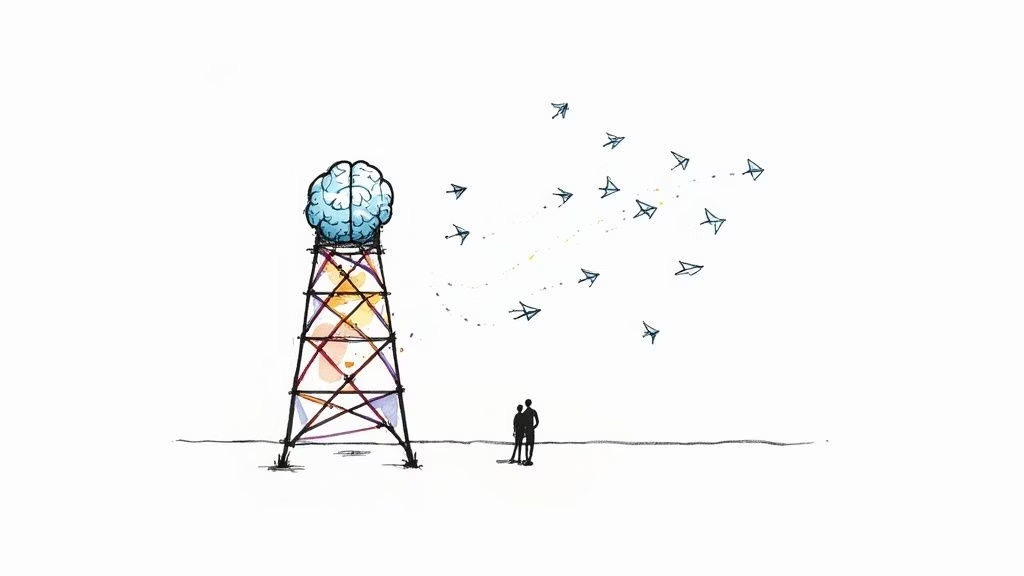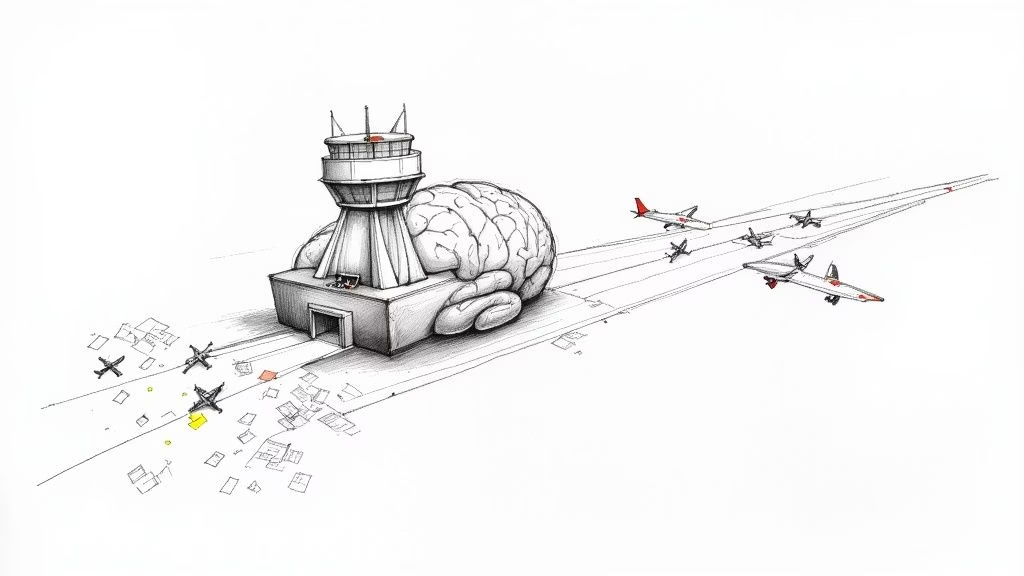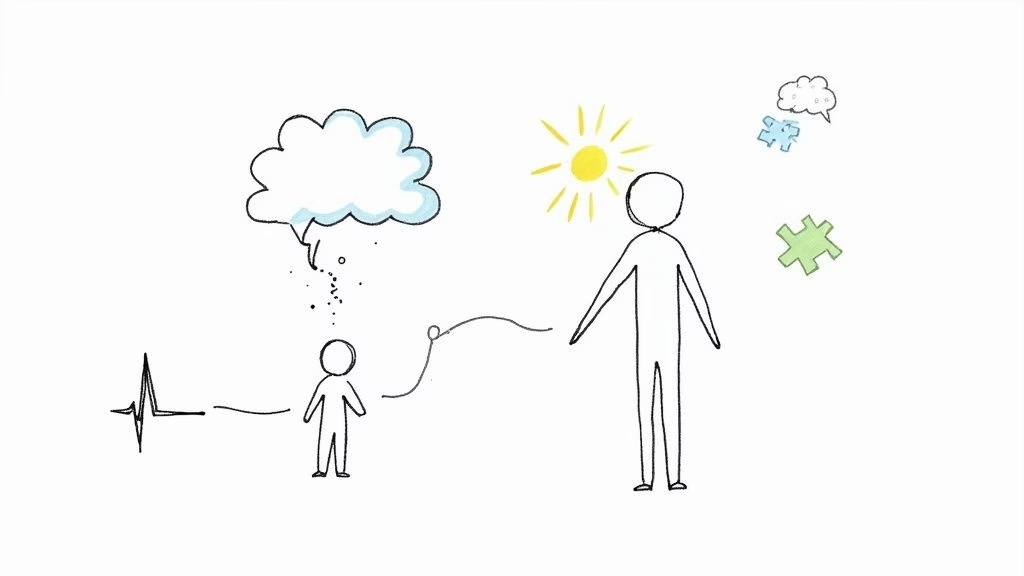In a world dominated by screens, the ability to navigate face-to-face interactions is more vital than ever. For teenagers, developing strong social skills is a cornerstone of mental well-being, academic achievement, and future success. These abilities, from reading social cues and communicating clearly to resolving conflicts and collaborating effectively, are not just ‘nice to have’; they are essential tools for life.
However, many teens struggle with social anxiety, communication, and motivation, which can lead to procrastination and difficulties in school. This article provides parents and educators with a comprehensive guide to practical, evidence-based social skills activities for teenagers. We will explore engaging exercises designed to build confidence and competence in real-world scenarios.
Each activity is supported by actionable parenting tips and connections to mental health resources. You will find specific strategies to help teens see how improving these skills can directly boost their academic motivation and help them overcome procrastination. This guide is built to equip your teen with the tools they need to thrive, not just socially, but in every aspect of their lives, from the classroom to their future career. Let’s explore the powerful ways to build these critical life skills.
1. Role-Playing and Scenario Practice: The Social Rehearsal
Role-playing offers a safe, controlled environment for teenagers to practice navigating complex social situations without real-world consequences. This “social rehearsal” allows them to experiment with different responses, build confidence, and develop crucial communication skills. It’s one of the most effective social skills activities for teenagers because it directly bridges the gap between knowing what to do and actually doing it.
How It Works
The core idea is to act out realistic scenarios. A facilitator, such as a parent or therapist, presents a situation, and participants take on roles to play out the interaction. Afterward, the group discusses what went well and what could be improved, providing constructive feedback.
Key Insight: The power of role-playing lies in its ability to build “muscle memory” for social interactions. By practicing a scenario, a teen is more likely to recall and use effective strategies when facing a similar situation in real life, reducing anxiety and hesitation.
Scenarios to Practice
- Conflict Resolution: Role-play a disagreement with a friend over a group project. Focus on using “I” statements, active listening, and finding a compromise. This helps teens manage emotions and avoid blaming, skills that are crucial for maintaining healthy relationships.
- Peer Pressure: Create a scenario where a teen is offered a vape at a party. This allows them to practice assertive refusal techniques, such as a firm “no, thanks” or suggesting an alternative activity.
- Academic and Motivational Challenges: Act out a conversation with a teacher about asking for an extension on an assignment due to feeling overwhelmed. This tackles procrastination head-on by teaching teens how to advocate for their needs, a vital skill for managing academic stress.
- Job or College Interviews: Simulate a formal interview to practice answering common questions, making eye contact, and presenting themselves confidently.
Parenting Tip
Start with low-stakes, even humorous, scenarios at home. Keep it light and focus on the effort, not a perfect performance. The goal is to make it a comfortable practice, not a high-pressure test. Validate their feelings about the scenarios, acknowledging that these situations can be genuinely tough.
2. Group Discussion Circles: Fostering Authentic Connection
Group Discussion Circles are structured conversations that create a safe, judgment-free space for teenagers to share experiences and practice essential communication skills. By gathering in a circle, participants are positioned as equals, which encourages authentic dialogue, empathy, and respectful turn-taking. This format is one of the most powerful social skills activities for teenagers because it directly builds the capacity for listening and understanding, cornerstones of any healthy relationship.
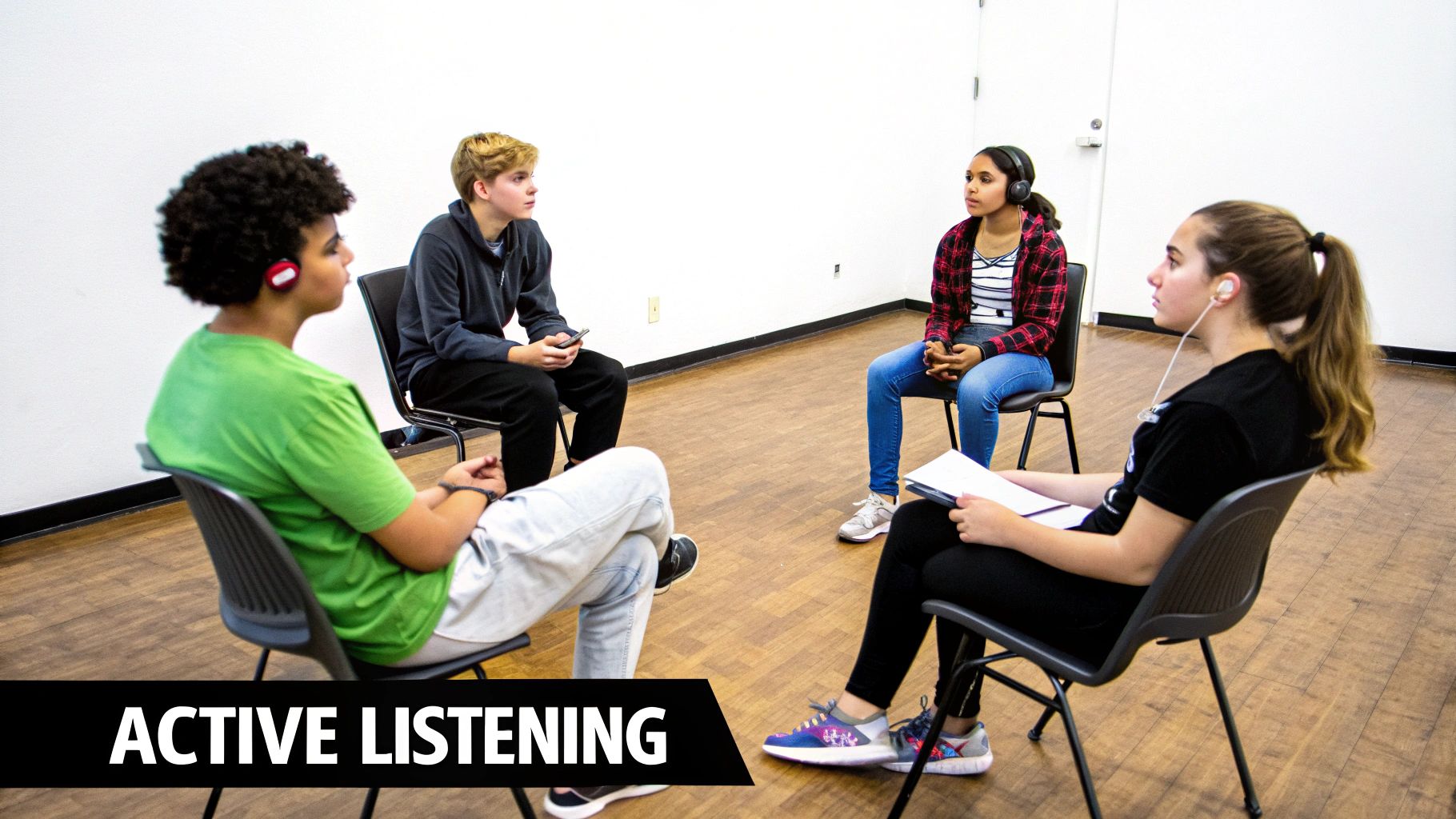
How It Works
A facilitator establishes clear ground rules for respect and confidentiality before introducing a specific topic or question. Participants then share their thoughts one at a time, often using a talking stick or other object to signify whose turn it is to speak. This process slows down the conversation, preventing interruptions and ensuring everyone has a chance to be heard. The focus is on sharing and listening, not debating or winning an argument.
Key Insight: The structure of a discussion circle intentionally dismantles social hierarchies. By physically and procedurally creating equality, it helps anxious or shy teens feel more comfortable contributing, while teaching more dominant personalities the value of active listening and patience.
Discussion Topics to Practice
- Navigating Stress and Procrastination: Pose a question like, “What does feeling overwhelmed with schoolwork look like for you?” This opens the door for teens to share struggles with motivation, normalize their experiences with stress, and learn coping strategies from one another.
- Building Empathy: Use prompts such as, “Share a time you felt misunderstood.” Hearing diverse perspectives on the same emotion helps teens develop empathy and see situations from another’s point of view, a key skill for conflict resolution. Learn more about the core social skills teens need to succeed on andrewpetrillolifecoaching.com.
- Peer Relationships: Discuss topics like “What makes a good friend?” or “How do you handle gossip?” These conversations allow teens to collaboratively define healthy relationship boundaries and social norms.
- Future Goals and Fears: Explore prompts about aspirations for college or careers, and the anxieties that come with them. This provides a supportive forum for teens to voice their fears and gain encouragement from peers.
Parenting Tip
Initiate discussion circles during family dinners with light topics. Use a “talking object” to practice respectful turn-taking. This models the skill in a familiar setting and can open up communication channels on more serious topics over time.
3. Team-Building Games and Challenges
Team-building activities shift the focus from individual success to collective achievement, teaching teenagers how to communicate, cooperate, and trust one another to reach a common goal. These games create a dynamic, hands-on learning environment where negotiation, shared responsibility, and mutual support are essential for success. This makes them powerful social skills activities for teenagers, as they learn to value diverse perspectives and manage group dynamics in a low-stakes, engaging context.
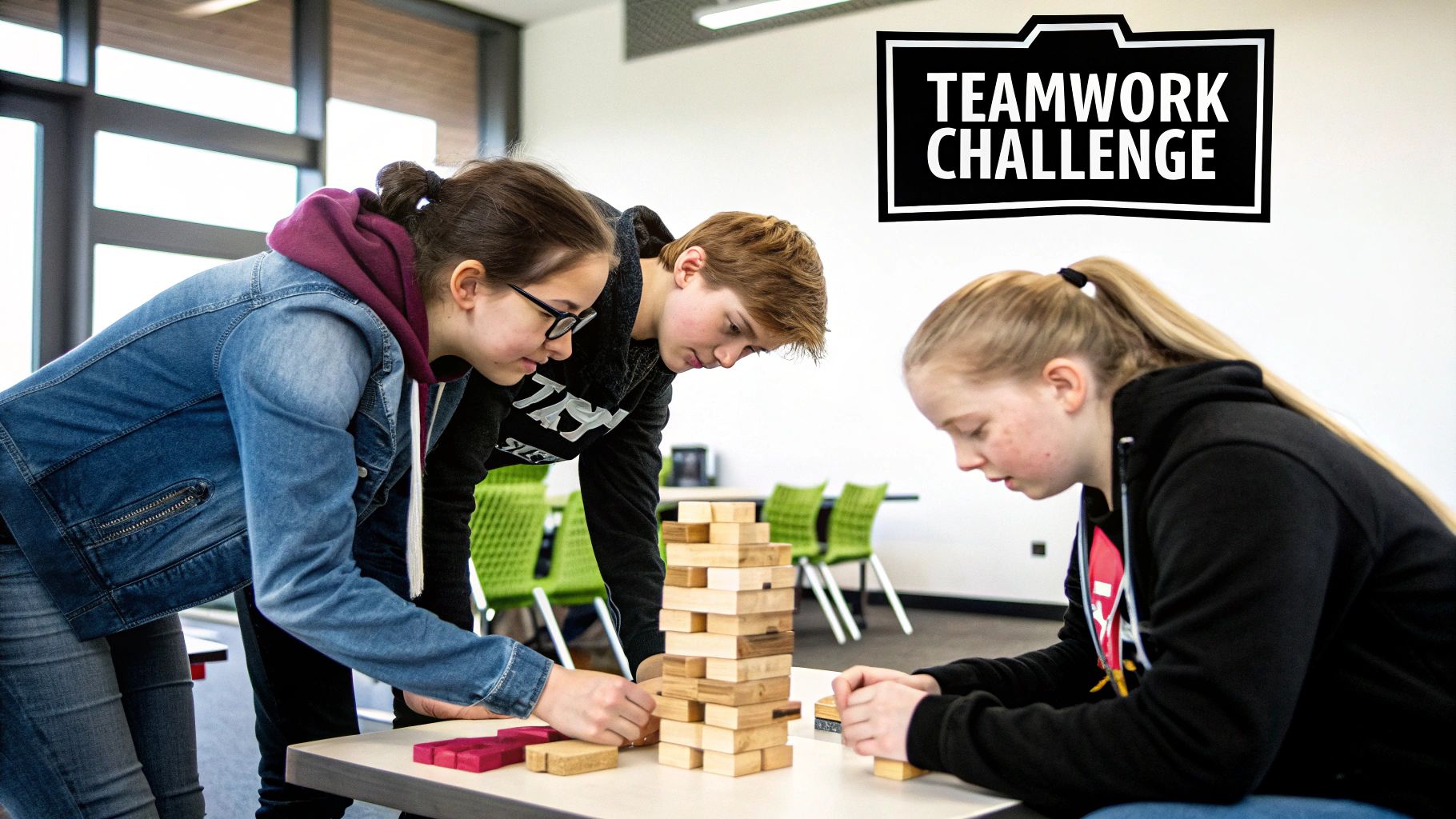
How It Works
The premise is to present a group of teenagers with a challenge that is difficult or impossible to solve alone. This could be a physical obstacle course, a complex puzzle, or a strategic game. As they work together, a facilitator can observe interactions and guide a debriefing session afterward to discuss what strategies worked, where communication broke down, and how they can improve their teamwork in the future.
Key Insight: Team-building challenges directly combat procrastination and motivation issues by framing tasks as a shared responsibility. When teens feel accountable to their peers, they are more likely to stay engaged and contribute, building a positive feedback loop of effort and accomplishment that can transfer to academic group projects and other areas of life.
Examples of Team-Building Activities
- Escape Rooms: These immersive experiences require a team to find clues, solve puzzles, and work together under a time limit. They are excellent for developing problem-solving skills and communication under pressure.
- Low-Ropes and Adventure Courses: Often found at camps or leadership retreats, activities like the “Human Knot” or “Trust Fall” (with proper safety supervision) build physical and emotional trust among participants.
- Collaborative Building Challenges: Using materials like spaghetti and marshmallows or LEGO bricks, task a group with building the tallest or strongest structure. This encourages planning, delegation, and creative problem-solving.
- Wilderness Expeditions: Programs like those pioneered by Outward Bound use outdoor challenges to foster resilience, leadership, and an understanding of interdependence, which are vital skills for navigating the transition to college and adulthood.
Parenting Tip
Frame teamwork as a “superpower” rather than a chore. After a family game or activity, ask questions like, “What was one thing someone else did that helped our team?” This reinforces the value of collaboration and mutual support.
4. Peer Mentoring Programs: Leading by Example
Peer mentoring programs create structured, supportive relationships where an older or more experienced teen guides a younger one. This framework provides an authentic context for social learning, as both the mentor and mentee develop crucial skills like leadership, empathy, and active listening. It stands out as one of the most powerful social skills for teenagers because it fosters responsibility and models positive behavior in a real-world setting.
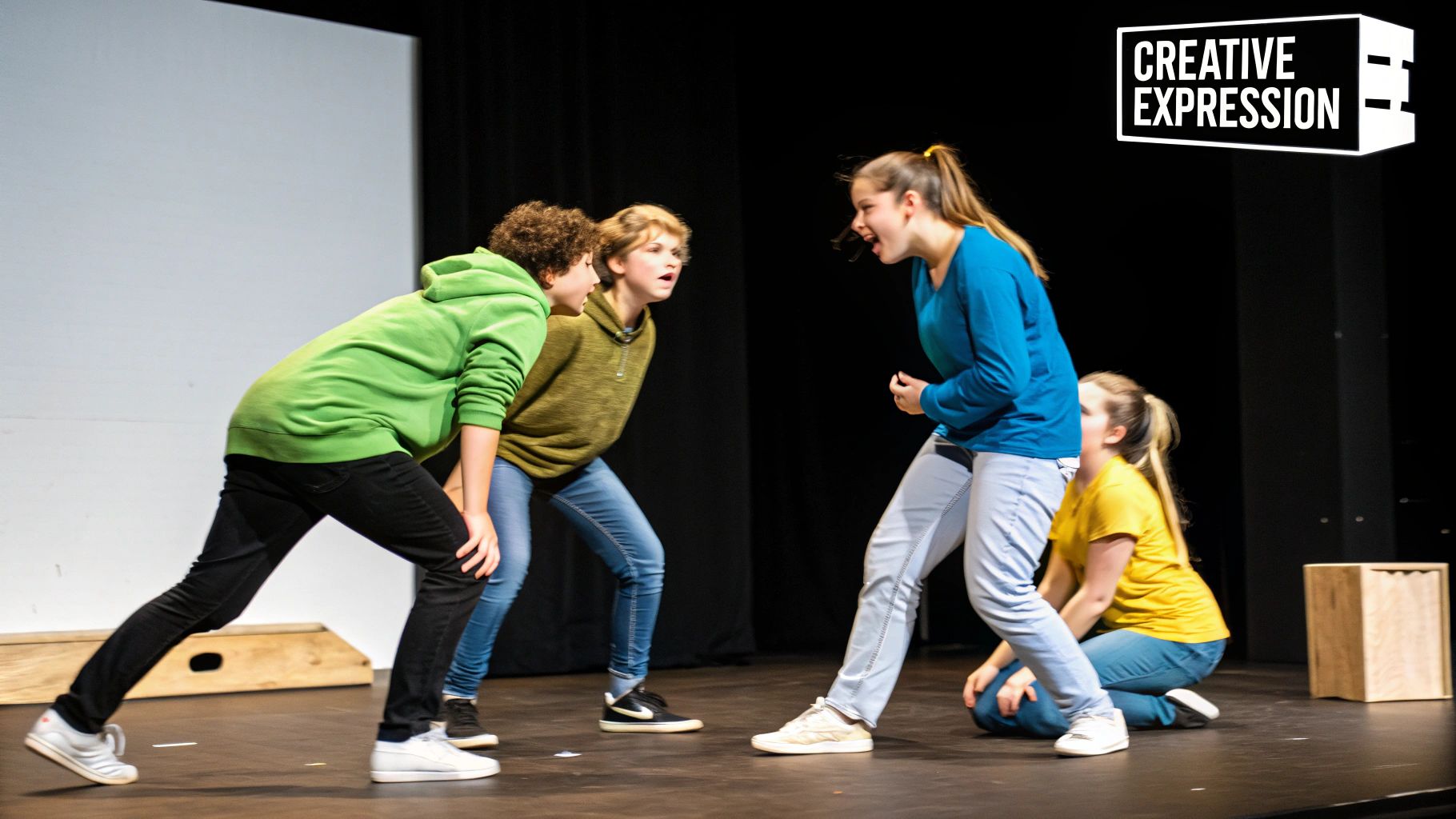
How It Works
These programs, often run through schools or community organizations, pair mentors and mentees based on interests and needs. Mentors act as role models, offering guidance on everything from navigating social circles to managing academic workloads. The relationship helps mentees build confidence, while mentors gain invaluable leadership experience, reinforcing their own social and emotional skills. The positive influence of a mentor can be a significant factor in a teen’s personal growth, as discussed in The Power of Mentorship.
Key Insight: Mentoring turns social skills into a lived experience rather than a theoretical lesson. For mentors, teaching a skill like conflict resolution reinforces their own understanding. For mentees, receiving advice from a relatable peer makes it more impactful and less intimidating than from an adult.
How to Implement and Participate
- For Mentors (The Teen): Taking on a mentor role is a fantastic way to combat procrastination and build motivation. Teaching others reinforces one’s own knowledge and sense of responsibility. It builds confidence, leadership, and communication skills that are highly valued in college applications and future careers.
- For Mentees (The Teen): Having a peer mentor provides a safe space to ask questions about social challenges or academic stress. It offers a relatable perspective on overcoming obstacles, from making new friends to managing a tough class schedule, which can significantly reduce anxiety.
- For Parents: Encourage your teen to join established programs like Big Brothers Big Sisters or a school’s Link Crew. When considering a program, ask about their training process, how they match peers, and what kind of supervision is provided to ensure a safe and productive experience.
5. Community Service Projects: Building Skills Through Shared Purpose
Community service projects provide a dynamic, real-world setting for teenagers to develop social skills while contributing to a cause greater than themselves. By working collaboratively toward a common goal, teens practice communication, teamwork, and empathy in an authentic context. These experiences are powerful social skills activities for teenagers because they shift the focus from personal anxiety to collective achievement, making social interaction feel more natural and purposeful.
How It Works
This approach involves teens participating in organized volunteer activities designed to address a community need. Under the guidance of adult supervisors, they work alongside peers and interact with diverse members of the public. The shared task creates a natural framework for conversation and cooperation, helping teens build relationships and a sense of belonging. The process often includes time for reflection to connect their actions to broader social issues and personal growth.
Key Insight: Engaging in service helps teens develop a stronger sense of identity and purpose, which can combat feelings of apathy and procrastination. Research shows that volunteering is linked to higher self-esteem and lower rates of depression. When teens see the direct impact of their efforts, it boosts their motivation, creating a positive feedback loop that can extend into academic and personal life.
Scenarios to Practice
- Environmental Cleanup: Participating in a park or beach cleanup requires coordinating tasks, communicating with a team, and working together efficiently. This builds teamwork and a sense of shared responsibility.
- Food Bank Volunteering: Sorting donations or serving meals involves interacting with diverse community members and collaborating with other volunteers. This enhances empathy, communication skills, and the ability to work in a structured environment.
- Senior Center Programs: Reading to or playing games with seniors offers invaluable practice in intergenerational communication, active listening, and patience. It helps teens build confidence in speaking with adults and learn from different life perspectives.
- Habitat for Humanity Youth Programs: Building a house requires clear communication, problem-solving, and following instructions within a team. This teaches practical cooperation and perseverance on a long-term project.
Parenting Tip
Help your teen find volunteer opportunities that align with their interests, whether it’s animals, the environment, or technology. A personal connection to the cause will boost their intrinsic motivation to participate and engage with others.
6. Improv and Drama Activities: The Unscripted Conversation
Improv and drama activities move beyond rehearsed responses, teaching teenagers to think on their feet, listen intently, and collaborate spontaneously. By engaging in creative, unscripted exercises, teens develop mental flexibility and confidence in unpredictable social situations. These are powerful social skills activities for teenagers because they build the ability to handle conversations that don’t go according to plan, reducing social anxiety and boosting creative problem-solving.
How It Works
At its core, improv is built on the principle of “Yes, and…,” which requires participants to accept what their partner offers and build upon it. This fosters a supportive, non-judgmental environment where teens practice active listening, validation, and collaboration. A facilitator leads the group through warm-ups and games that gradually increase in complexity, encouraging participants to let go of self-consciousness and embrace spontaneity.
Key Insight: Improv directly combats the fear of “saying the wrong thing.” By creating a space where there are no mistakes, only opportunities, it helps teens lower their internal filter, which often contributes to procrastination and social withdrawal. This freedom builds confidence to engage more openly in real life.
Scenarios to Practice
- “Yes, And…” Storytelling: Start a story with a single sentence (e.g., “The alien landed its spaceship in the school parking lot.”). Each person adds a new sentence, beginning with “Yes, and…”. This enhances listening and collaborative thinking.
- One-Word Story: The group builds a story one word at a time. This forces participants to pay close attention to the narrative and anticipate where it’s going, a key skill for following conversational threads.
- Emotional Mirroring: In pairs, one person expresses an emotion through facial expressions and body language without speaking, while the other mirrors them. This builds empathy and the ability to read non-verbal cues.
- Problem/Solution Scenes: One person presents an absurd problem (e.g., “My pet rock is afraid of the dark”), and the scene partner must help solve it. This develops creative problem-solving and supportive communication skills.
Parenting Tip
Encourage storytelling and creative thinking at home. Celebrate silly ideas and “going with the flow” during conversations. This reinforces the core principles of improv—acceptance and building on others’ ideas—in a natural way.
7. Social Skills Board Games and Card Games
Board games and card games offer a structured, fun, and non-confrontational way for teens to develop social competencies. These games create a low-stakes environment where following rules, taking turns, and managing emotions are part of the play. They are excellent social skills activities for teenagers because the game mechanics naturally encourage interaction, cooperation, and strategic thinking.
How It Works
The premise is to use gameplay as a vehicle for social learning. As teens engage with the game, they must communicate with others, wait for their turn, and handle both winning and losing gracefully. A parent or facilitator can guide the experience, gently pointing out social cues or prompting discussions that arise organically during play. After the game, a debrief can help teens connect their in-game actions to real-world social scenarios.
Key Insight: Games provide a natural framework for practicing social skills without the direct pressure of a therapy session. The focus is on the fun of the game, which lowers defensiveness and makes teens more receptive to learning skills like emotional regulation and fair play.
Games and Strategies to Try
- Cooperative Games: Choose games like Pandemic or The Crew, where all players work together toward a common goal. These games are exceptional for teaching collaboration, joint problem-solving, and communication, as the group succeeds or fails as a team. This can be especially helpful for teens who struggle with competitiveness or procrastination on group projects at school.
- Conversation-Starting Games: Use card games like Ungame or TableTopics: Teen Edition. These games provide prompts designed to spark discussions about feelings, experiences, and opinions. This helps teens practice sharing, listening, and learning more about their peers in a structured way.
- Strategic Games: Classic strategy games require players to think ahead and anticipate others’ moves. This encourages perspective-taking and impulse control, crucial skills for navigating complex social dynamics and making thoughtful decisions rather than reactive ones.
- Debriefing After Play: After any game, ask open-ended questions like, “What was a challenging moment for you?” or “How did our team work well together?” This reflection helps teens internalize the social lessons learned during the activity.
8. Digital Communication Workshops: Navigating the Social Web
In today’s world, a significant portion of a teenager’s social life happens online. Digital Communication Workshops are structured sessions designed to teach healthy online interaction, digital citizenship, and how to manage relationships on social media. These workshops are essential social skills activities for teenagers, providing them with the tools to translate positive social behaviors from the real world to the digital one and back again.
How It Works
These workshops, often facilitated by schools, community centers, or experts, move beyond simple “don’t do this” warnings. They create a collaborative space for teens to explore the nuances of digital etiquette, online conflict, and the impact of their digital footprint. Participants analyze real-world examples, discuss scenarios, and co-create guidelines for respectful online engagement, addressing issues from cyberbullying to the pressure of maintaining a “perfect” online persona.
Key Insight: These workshops reframe digital life not as a separate world, but as an extension of real-life relationships. Teaching teens to apply principles like empathy, respect, and clear communication online directly strengthens their ability to manage friendships, academic collaborations, and future professional interactions in any context.
Workshop Topics to Cover
- Mindful Social Media Use: Discuss the link between excessive screen time, anxiety, and procrastination. Explore strategies for setting boundaries, curating a positive feed, and using platforms intentionally rather than passively.
- Conflict and Misinterpretation: Analyze how tone is lost in text. Practice clarifying meaning, de-escalating online disagreements, and knowing when to take a conversation offline to avoid misunderstandings that can damage friendships.
- Building a Positive Digital Footprint: Frame online presence as a tool for future success. Cover how to build a profile that reflects their skills and character positively for college admissions or future employers, connecting online behavior to real-world opportunities. Learn more about how to navigate these conversations and find valuable resources by exploring our in-depth guide to Digital Communication Workshops.
- Digital Citizenship and Empathy: Role-play responses to cyberbullying or seeing someone being excluded online. This helps teens build the skills and courage to be upstanders rather than bystanders, fostering a more supportive online community.
9. Conflict Resolution Training: The Peacemaker’s Toolkit
Conflict is an unavoidable part of life, but for teenagers, disagreements can quickly escalate due to intense emotions and developing social skills. Structured conflict resolution training equips them with a toolkit to navigate disputes constructively, turning potential blow-ups into opportunities for growth and understanding. This makes it one of the most essential social skills activities for teenagers, as it builds resilience and preserves relationships.
How It Works
These programs, often found in schools or community centers, teach practical, step-by-step methods for de-escalation and mediation. Participants learn to identify the root causes of a conflict, listen actively to opposing viewpoints, and collaboratively brainstorm solutions where everyone feels heard and respected. The focus is on communication and empathy rather than winning or losing.
Key Insight: Conflict resolution isn’t about avoiding disagreements; it’s about changing how teens respond to them. By learning to regulate their initial emotional reactions and listen before they speak, they can prevent minor issues from damaging friendships or causing significant stress.
Scenarios to Practice
- Peer Mediation: A teen learns to act as a neutral third party to help two friends resolve a misunderstanding. This builds leadership and empathy, reinforcing the idea that they can be a force for peace within their social circle.
- Managing Academic Disputes: Practice a conversation between students who disagree on how to divide work for a group project. This addresses common sources of school-related stress and procrastination, teaching them to negotiate responsibilities fairly.
- Family Disagreements: Apply conflict resolution principles to a common household issue, like chores or curfew. This helps teens practice advocating for their perspective respectfully while also understanding their parents’ concerns.
- Restorative Circles: Participate in programs, like those using restorative justice models, where teens discuss the impact of their actions on others, fostering accountability and repairing harm within a community.
Social Skills Activities Comparison Matrix
| Item | Implementation Complexity | Resource Requirements | Expected Outcomes | Ideal Use Cases | Key Advantages |
|---|---|---|---|---|---|
| Role-Playing and Scenario Practice | Moderate (requires skilled facilitation) | Moderate (space, props, facilitator) | Improved confidence, social competence, empathy | Practicing high-stakes social situations | Safe practice environment, immediate feedback |
| Group Discussion Circles | Low to Moderate (needs consistent facilitation) | Low (space, facilitator) | Enhanced active listening, empathy, verbal skills | Building community and communication | Easy setup, promotes authentic self-expression |
| Team-Building Games and Challenges | Moderate (planning and materials needed) | Moderate to High (space, materials) | Increased teamwork, trust, communication skills | Developing cooperation and trust | Engaging, appeals to multiple learning styles |
| Peer Mentoring Programs | High (coordination and training required) | High (adult supervision, training) | Leadership development, strong peer relationships | Long-term mentoring and support programs | Authentic peer connections, leadership growth |
| Community Service Projects | Moderate to High (logistics and supervision) | Moderate to High (coordination, transport) | Empathy, leadership, civic engagement | Volunteerism and community impact | Meaningful purpose, social awareness |
| Improv and Drama Activities | Moderate (needs skilled facilitation) | Low to Moderate (space, props) | Confidence, creativity, emotional intelligence | Creative expression and communication | Builds spontaneity and public speaking skills |
| Social Skills Board/Card Games | Low (easy to set up and run) | Low (games and facilitator) | Turn-taking, rule-following, social communication | Skill practice in low-pressure setting | Structured, repeatable, game-based learning |
| Digital Communication Workshops | Moderate (requires tech knowledge) | Moderate (tech resources, facilitator) | Digital literacy, online safety, social media skills | Teaching modern digital communication | Addresses relevant online challenges |
| Conflict Resolution Training | Moderate (needs skilled facilitation) | Moderate (training materials, facilitator) | Emotional regulation, de-escalation, mediation skills | Handling conflicts and bullying | Practical life skills, reduces aggression |
From Activities to Action: Building a Foundation for Life
Navigating the complex social landscape of adolescence is a significant developmental milestone. The activities detailed in this article, from structured Role-Playing Scenarios to collaborative Community Service Projects, are more than just exercises. They are practical, repeatable tools designed to build a strong foundation of social intelligence that will serve teenagers throughout their academic careers and into adulthood. Each activity offers a unique avenue for growth, whether it’s learning to read nonverbal cues in Improv Games or practicing assertive communication in Conflict Resolution Training.
The journey of developing these skills is not about achieving perfection. It’s about progress, practice, and building the confidence to engage with the world authentically. These social skills activities for teenagers provide safe, structured environments where they can experiment, make mistakes without significant consequence, and receive constructive feedback. This process of trial and learning is the very essence of growth.
The Connection Between Social Skills, Motivation, and Success
It’s crucial to recognize the powerful link between social competence, mental well-being, and academic motivation. A teenager who feels socially anxious or isolated may struggle to participate in class, collaborate on group projects, or even ask a teacher for help. This can lead to a cycle of avoidance and procrastination, impacting grades and overall school engagement.
Conversely, a teen who feels confident in their ability to communicate and connect with others is better equipped to handle academic and personal challenges. They are more likely to:
- Advocate for their needs in the classroom.
- Build a supportive peer network, which is a key buffer against stress and anxiety.
- Tackle difficult tasks with a growth mindset, viewing setbacks as learning opportunities rather than personal failures.
- Manage their time effectively, as social confidence often correlates with improved executive functioning skills.
A Parent’s Role: Coach, Guide, and Role Model
For parents and guardians, supporting a teen’s social development is a delicate balance of providing guidance without being overbearing. Your role is not to direct every interaction but to be a supportive coach. This involves fostering open communication about their social experiences, validating their feelings, and modeling the positive behaviors you wish to see. Celebrate their efforts, not just their successes. Acknowledging the courage it takes to try something new, like joining a drama club or volunteering, can be more impactful than praising a flawless social performance.
If you notice your teen is struggling significantly with social anxiety, motivation, or signs of depression, it is essential to seek professional resources. Reputable organizations like the National Institute of Mental Health (NIMH) and The Jed Foundation offer valuable information and support networks tailored for teens and their families. Remember, seeking help is a sign of strength and a critical step toward ensuring your teen has the comprehensive support they need to thrive. The ultimate goal is to empower them with the skills and self-assurance to build meaningful relationships and navigate life’s challenges with resilience and grace.
If you’re looking for personalized, one-on-one support to help your teen navigate these challenges and build the confidence they need to succeed, consider professional coaching. Andrew Petrillo Life Coaching specializes in empowering young adults to overcome obstacles like procrastination, social anxiety, and a lack of motivation by developing actionable strategies for lasting success. Explore how targeted coaching can unlock your teen’s potential at Andrew Petrillo Life Coaching.















